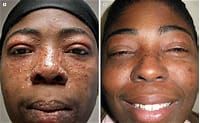Dilemma of immunosuppression and infection risk in systemic lupus erythematosus

Abstract
Patients with SLE are at high risk of various infections as evidenced by a number of studies. The main determinants of infection in SLE are disease activity, organ damage, and often inevitable medication. The molecular and cellular mechanisms underlying infection remain unclear. Impaired immunity, immunosuppressants and corticosteroids clearly increase the risk of infection, whereas some medications, such as low-dose IL-2, hydroxychloroquine and IVIG are safe in SLE patients with substantial evidence. It is important to balance the immunosuppression and infection risks in practice. This article focuses on medication-related infections in SLE and discusses the therapeutic options for the disease in clinical practice.
Infection in SLE is an important cause of hospitalizations and mortality. Previous studies showed that infection is the leading cause of death in SLE patients. Infection accounts for ∼29.2–43.9% of the morbidity of SLE patients. Other factors, including atherosclerosis and nephritis, can also increase morbidity. Opportunistic infections are very common clinically and are related to impaired cellular and humoral immune functions in patients with SLE.
The underlying mechanisms for susceptibility to infection remain unclear, but various explanations have been proposed, including immunosuppressive therapies and immunological changes responsible for infections. On the other hand, pathogens are thought to induce autoimmunity via molecular mimicry and have been shown to stimulate the production of IFN and anti-dsDNA antibodies in SLE patients.
It has been suggested that dysfunction in T cells, B cells, and NK cells, might play a role in the development of infection in SLE. Defective phenotypes and functioning of neutrophils, monocytes, macrophages, and dendritic cells (DCs) have been identified in SLE patients. These defects are important in the pathogenesis of SLE, including ineffective apoptotic debris clearance, self-antigen presentation, and inflammatory cytokine production.
Moreover, immunosuppressive treatments and corticosteroids (CSs) can impair protective immunity, which increases the risk of infections in these patients. Of note, certain medications such as low-dose IL-2 (Ld-IL2), HCQ and IVIG, emerge as promising therapies for treating autoimmune disorders, including SLE, without interfering with anti-infective immune responses. In this review, we investigate drug-associated infection and potential approaches to improve the outcome of SLE patients.
Reference
Jing He, Zhanguo Li, Dilemma of immunosuppression and infection risk in systemic lupus erythematosus, Rheumatology, Volume 62, Issue Supplement_1, April 2023, Pages i22–i29, https://doi.org/10.1093/rheumatology/keac678
